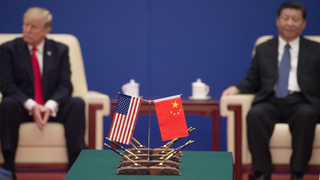When Australian Foreign Minister Marise Payne called for an independent inquiry into the COVID-19 pandemic on ABC Insiders last Sunday, she would have expected a rebuke from Beijing.
But she and the other Australian leaders who have since put their name to this request – including Shadow Foreign Minister Penny Wong – probably didn’t count on being caught up in China’s war of words with the United States over the pandemic.
This is the regrettable place where we and other middle powers find ourselves today.
Rather than coming together as an international community to respond to and learn from the worst global health crisis in living memory, the world is witnessing an intensification of US-China rivalry for influence at a time when neither can claim to have been sufficiently prepared.
China’s Foreign Ministry spokesman Geng Shuang was sharp with his words, calling Payne’s doubts about Chinese “transparency” with regards to the pandemic “disrespectful” and “inconsistent with the facts.” But he went further to deliberately discredit Canberra’s call for an inquiry by hinting that Washington was behind it – declaring, inaccurately, that Australia was “dancing to the tune of a certain country to hype up the situation.”
This couldn’t be further from the truth.
Beijing’s opposition to a no-holds-barred examination of the origins and trajectory of the pandemic may well derail our calls for a genuinely independent international review. But it doesn’t make it an invalid or disingenuous request.
Instead of forging greater international cooperation, we are in the midst of a diplomatic blame game between China and the United States which hurts all parties by curtailing opportunities for effective collective responses.
In an attempt to deflect widespread criticism of his own performance, Trump announced last week that his administration would halt funding to the World Health Organization pending a review into its early handling of the pandemic.
Notwithstanding prior praise of Beijing’s response, Trump accused the organisation of unwarranted deference that “willingly took China’s assurances to face value” and “pushed [its] misinformation.”
The United States is by far the biggest donor to the WHO, comprising 15 per cent of total voluntary contributions and dwarfing China’s annual input by a factor of 10. The administration’s decision has faced worldwide condemnation and risks upending the organisation’s efforts to curb the spread of COVID-19, particularly in low-income countries.
The announcement also follows sustained efforts by President Trump and senior administration officials to label COVID-19 as the “Wuhan” or “Chinese” virus, rejecting international conventions whilst stoking xenophobia.
Chinese Foreign Ministry officials have matched these efforts in-kind, circulating wholly unfounded conspiracy theories that the coronavirus originated in America and was spread by the US Army.
While US-China tensions did not begin with coronavirus, their effects are now being keenly felt.
Crucial collaboration between the public health agencies of both countries has declined in recent years due, in part, to the deterioration in bilateral ties. In 2017, China introduced legislative restrictions on the work of foreign-based researchers that required the monitoring of their activities by local security agencies, focusing some in the global health business to pack up shop.
In the context of an escalating trade war and deteriorating relations between the two great powers, the number of staff working at US Centers for Disease Control and Prevention operations inside of China has fallen from 47 to 14 since Trump took office in 2017.
None of these are good outcomes for the world. Infectious disease outbreaks have historically generated opportunities for international cooperation. Failures by both sides to adequately to prepare for the pandemic, coupled with a spiralling contest for influence between Beijing and Washington, suggests that history, this time, is not on our side.
Read more from the authors on this topic in their recent article for ABC News, "Coronavirus crisis shows both China and the US aren't equipped to lead the world".







